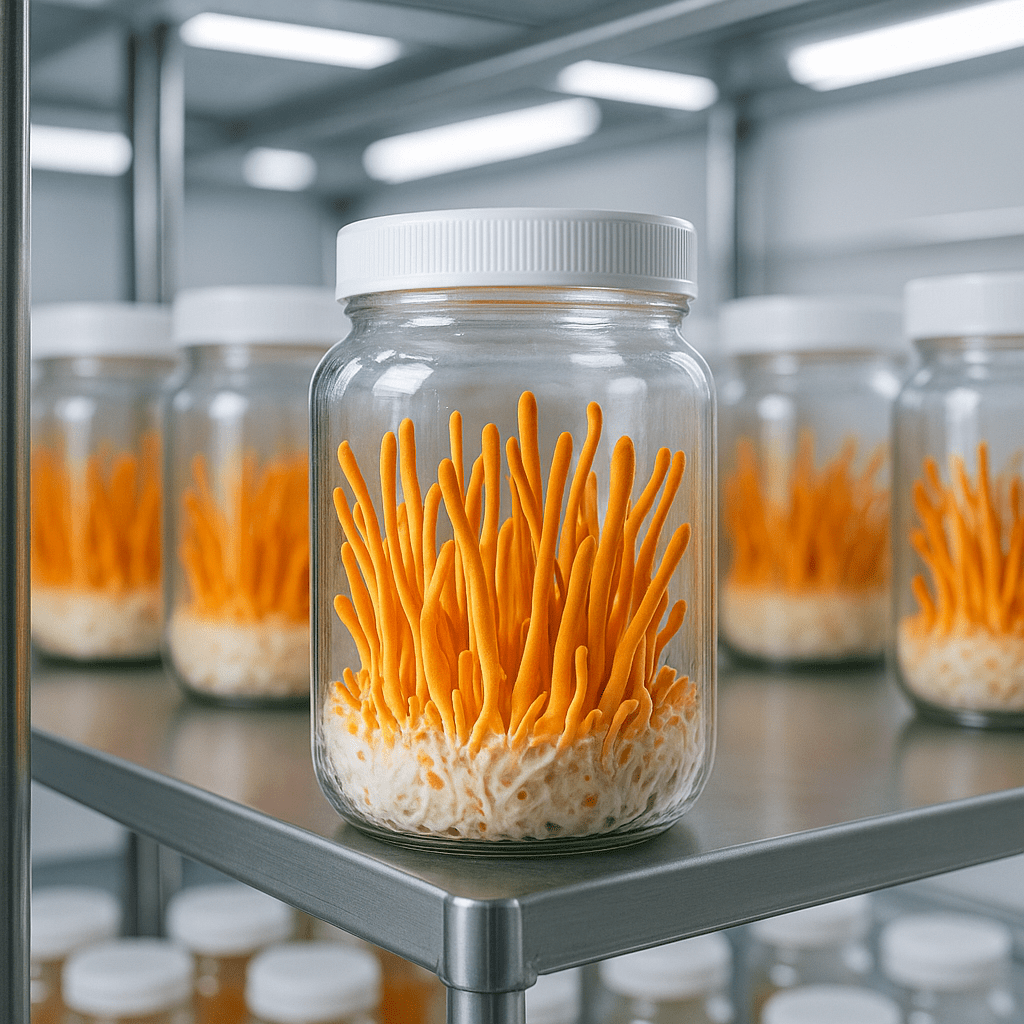Cordyceps is a parasitic fungus traditionally used in East Asian medicine, and is now increasingly popular as a dietary supplement for health promotion. This unusual fungus is gaining increasing interest due to its scientifically researched health benefits, from boosting immunity to increasing energy. In this article, we will take a scientifically sound yet practical look at the potential benefits of cordyceps, how to use it safely, and potential side effects.
Like the health benefits of chlorella, cordyceps is also being studied for its immune-boosting and antioxidant properties, which may benefit overall health.
What is cordyceps mushroom?
Cordyceps is a unique parasitic fungus, whose name comes from the Latin words “cordyceps” (insect larva) and “sinensis” (Chinese), referring to its origin and growth method. This fungus grows in its natural environment on certain insects (most often butterfly larvae), occupying and replacing the host’s tissues with its fungal structures.

The most highly regarded species of cordyceps are Cordyceps sinensis (now scientifically reclassified as Ophiocordyceps sinensis) and Cordyceps militaris. Cordyceps has been used in traditional Chinese and Tibetan medicine for centuries, where it is considered an adaptogen that helps the body adapt to stress, increases energy, and strengthens immunity.
Natural cordyceps grows at high altitudes in the Himalayan regions, especially in Tibet and the provinces of China. Due to its rare growing conditions and high demand, natural cordyceps is one of the most expensive medicinal mushrooms in the world. Today, most commercial cordyceps products are produced in laboratories, growing the mushrooms under controlled conditions, which ensures greater availability and lower prices.

Cordyceps Life Cycle and Cultivation
In nature, cordyceps has an extraordinary life cycle. Its spores infect a living insect, usually a butterfly larva that lives underground. The fungus gradually colonizes the insect’s body, causing it to die. In the spring, as temperatures rise, the insect’s body grows a fruiting body—a long, rod-shaped structure that burrows through the ground and releases spores, completing the life cycle.
Modern methods of growing cordyceps in laboratories allow the fungus to be grown using special media rather than insect hosts. This process creates more ethically acceptable products that are also more standardized and less contaminated.
Key benefits of cordyceps mushroom
Cordyceps is increasingly becoming the subject of scientific research as more people become interested in natural ways to improve their health. While some of its traditional uses still await solid scientific evidence, recent studies are showing some interesting results.
Evidence-Based Uses and Traditional Claims
Energy and Stamina: One of the most well-known properties of cordyceps is its ability to increase energy and stamina.

Studies show that cordyceps can improve cellular oxygen utilization and ATP (the cell’s energy source) production. A 2010 study found that cordyceps supplements improved endurance and oxygen uptake in athletes.
Boosting the immune system: Cordyceps has immunomodulatory properties, which may help strengthen the body’s natural defense mechanisms. It stimulates the activity of certain immune cells, including natural killer cells and macrophages, which help fight infection and disease.
Slowing down aging: Cordyceps has antioxidant properties, which may help combat oxidative stress, a major contributor to aging. Laboratory studies show that cordyceps may help protect cells from free radical damage.
Cardiovascular function: Some studies suggest that cordyceps may help lower “bad” cholesterol levels and improve cardiovascular function. It may also have blood pressure-lowering properties.
Respiratory Improvement: Cordyceps has traditionally been used to treat respiratory disorders. Research suggests that it may help dilate the bronchi, improve oxygen uptake, and reduce some signs of inflammation in the respiratory system.
Glucose Metabolism: Research is underway to examine the potential effects of cordyceps on diabetes management. Some studies suggest that it may help regulate blood glucose levels by increasing insulin sensitivity.
Anti-inflammatory Properties: Cordyceps contains components that may inhibit inflammatory responses in the body. This may be beneficial for a variety of chronic conditions characterized by inflammation.
While these results appear promising, it is important to note that many of the studies were conducted in labs or on animals, so more well-conducted clinical trials in humans are needed before more robust conclusions can be drawn.
If you are looking for a high-quality cordyceps supplement, it is worth choosing products from reputable manufacturers that guarantee the purity and potency of the ingredients.
How to Take Cordyceps: Forms, Dosage, and Safety
To get the most out of cordyceps, it’s important to know how to take it properly. There are a variety of cordyceps forms on the market, so you can choose the one that best suits your personal needs and priorities.

Supplement Forms:
- Capsules and tablets – the most convenient and popular form, easy to dose
- Powder – can be mixed with drinks, smoothies or food
- Tinctures – concentrated liquids that can be mixed with water
- Teas – a milder form suitable for daily use
- Extracts – concentrated products with standardized amounts of active ingredients
Typical Dosages: While dosages may vary depending on the product and concentration, most manufacturers recommend 1,000–3,000 mg of cordyceps per day. It’s a good idea to start with a lower dose and gradually increase it, observing your body’s response. Always follow the specific instructions on the product label.
Usage Tips: Some studies suggest that cordyceps is best taken with food for better absorption. Athletes often take it before workouts to boost energy, but other users may experience greater benefits if they take the supplement in the morning or mid-day.
Who should avoid cordyceps?
While cordyceps is safe for most healthy adults, some people should exercise caution or avoid it altogether:
- Pregnant or nursing women – not recommended due to insufficient research
- Individuals with autoimmune diseases – due to the immunomodulatory effects of cordyceps
- Patients taking blood thinners – cordyceps may have similar effects and increase the risk of bleeding
- Individuals preparing for surgery – it is recommended to stop taking it at least 2 weeks before surgery
- Children – due to insufficient safety data
It is recommended to consult a healthcare professional before starting any new supplement, including cordyceps, especially if you have a chronic medical condition or are taking other medications.
When looking for a quality product, consider cordyceps mushroom capsules from reputable manufacturers who guarantee the purity and efficacy of the product.
Potential Side Effects and Risks
While cordyceps is generally considered safe for most healthy adults, it is important to be aware of the potential side effects and risks so that you can make an informed decision about its use.
Most Common Side Effects:
- Digestive upset – nausea, diarrhea, or stomach pain
- Dry mouth, lips, or throat
- Insomnia, especially if taken late in the day (due to its stimulant effects)
- Headache
- Rash or itching (allergic reactions)
Potential Risks:
Hepatotoxicity: Although rare, some studies have suggested that mushroom supplements, including cordyceps, may have negative effects on liver function, especially with long-term use. Individuals with liver disease should be especially cautious.
Allergic reactions: People who are allergic to molds or fungi may also be sensitive to cordyceps. Allergic reactions can range from a mild rash to more severe symptoms.
Drug Interactions: Cordyceps may interact with various medications, especially:
- immunosuppressive drugs – cordyceps may reduce their effectiveness
- anticoagulants – may increase the risk of bleeding
- diabetic drugs – may enhance the glucose-lowering effect
- stimulants – may enhance the stimulant effect
Healthcare professionals have varying opinions about cordyceps. While some acknowledge its potential benefits, others remain skeptical due to the lack of clinical research. Most agree that larger, well-controlled clinical trials are needed to confirm the traditional uses of cordyceps and determine optimal dosage regimens.
In the European Union, including Lithuania, cordyceps is classified as a food supplement, not a drug. This means that it is not strictly regulated like pharmaceutical products, and manufacturers cannot claim that it treats, reduces, or prevents diseases.
When it comes to natural supplements that can positively affect gut and immune health, it is also worth mentioning the benefits of spirulina for gut and immune health, which can be a great addition to a healthy diet.
Conclusions
Cordyceps is an interesting and potentially beneficial supplement with a long history of use in traditional medicine and a growing body of scientific research supporting some of its properties. While cordyceps has shown promise in boosting energy, boosting immunity, and improving overall health, it is important to understand that not all traditional claims have been fully supported by modern scientific research.
Before taking cordyceps, it is recommended that you:
consult a healthcare professional, especially if you have a chronic condition or are taking medications
choose products from reputable manufacturers that guarantee purity and quality
start with lower doses and monitor your body’s reactions
be realistic about your expectations – supplements are not a miracle cure and work best as part of a healthy lifestyle
- As with most supplements, the effects of cordyceps may vary depending on your individual characteristics, lifestyle, and medical condition. Responsible
- consumption, based on scientifically proven
- information and professional advice, will
- help you maximize the potential of this ancient mushroom in modern healthcare.
P.S. If you want to experience the benefits of cordyceps, visit our website and get acquainted with functional pineapple cubes with hemp flowers, enriched with cordyceps extract – a delicious and convenient way to include this beneficial mushroom in your daily diet.
Frequently Asked Questions
What is cordyceps and how does it work?
Cordyceps is a medicinal mushroom traditionally used in Asia that is now being studied for its immune-boosting and energy-boosting properties. It works by supporting cellular energy production and may have adaptogenic effects.
Are cordyceps supplements safe?
Most healthy adults tolerate cordyceps well, but side effects can occur, especially in people with allergies or chronic conditions. Always consult your doctor before starting any new supplement.
What is the recommended daily dose of cordyceps?
In supplements, the typical dosage ranges from 500 mg to 1,500 mg per day, but follow the information on the label or the recommendations of a healthcare professional.
Can children take cordyceps?
Cordyceps is generally not recommended for children unless prescribed by a pediatrician, due to limited safety data.
Do cordyceps supplements improve athletic performance?
Some studies suggest possible effects on improving endurance or reducing fatigue, but more research is needed to draw firm conclusions.

